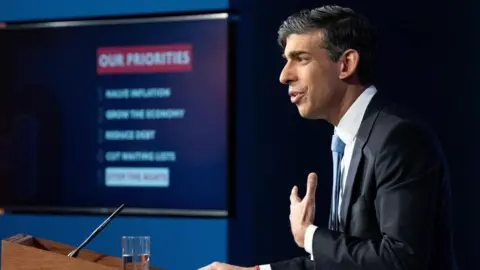Rwanda bill passes but poll gloom still haunts PM

 Reuters
ReutersThe lectern was back with its three word promise: "Stop the Boats."
Within minutes of the government completing the latest lap of its Rwanda policy legislative and legal marathon - winning Wednesday night's key vote - reporters were told the prime minister would be holding a news conference first thing on Thursday.
Several dozen of us rolled up at the Downing Street briefing room in 9 Downing Street to hear Rishi Sunak emerge from the din of his own party's two day squabble over whether his Rwanda plan is a dud.
As I've reported throughout this week, there had been a quiet confidence in government for days that when the main vote came, whether MPs backed the policy in its entirety or not, ministers would get their way.
The whips, responsible for discipline, were pretty sure their intelligence was solid and they knew how Conservative MPs intended to vote.
But they were acutely conscious too that Rishi Sunak had suffered his three biggest rebellions in the course of just two days, as around 60 of his MPs attempted to change his plans.
One senior figure reflected to me that you just never know if an act of rebellion will prompt a rebellion hangover in an MP, remorseful at their decision to defy the prime minister, or give them a first taste of something irresistible that compels them to make it a habit.
The news conference wasn't a real moment of victory. But it was the absence of defeat.
No-one outside Westminster will cheer a bill passing what's called third reading.
Some, such as Labour, the Liberal Democrats and others, will maintain that the policy is ridiculous.
And its advocates and others will - and do still - ask all the same questions, and don't get straight answers, not least the big one: will any migrants actually be sent to Rwanda before the general election?
Rishi Sunak doesn't offer a straight answer to that question because he can't. He is not in control of the House of Lords or the courts, and they both could gum up his plan to get a plane off to Kigali soon.
But Mr Sunak didn't seek to use this moment to change the record and talk about something else. Instead he wanted to continue talking about illegal immigration, and turn his focus to Labour.
There has been a deep frustration within Downing Street at the government's relative inability to do this, such has been the noise from their own side.
That said, I didn't manage to tempt the ever-disciplined prime minister to offer any public criticism of his bickering backbenchers when I got the chance to ask him a question.
In taking the political tussle to Labour he repeatedly used the phrase "back to square one" to describe how he thought Keir Starmer would handle the issue - and tried to draw a dividing line between his willingness to slog on with his Rwanda idea, and Labour's commitment to ditch it.
Instead, as he also said repeatedly, he would "stick to the plan".
That phrase is an illustration of the latest about turn in the Conservatives' campaigning strategy.
Having briefly pitched himself, at the Conservative conference in the autumn, as an agent of change, he has now switched to the more conventional electoral approach of a party long in government: stick with the folk you know, don't trust the other lot.
The thing is, having tried change and continuity, the opinion polls remain dire for the Tories. The political story of 2023 was Rishi Sunak's inability to budge the polls.
Just this week there has been a YouGov polls for The Times and the Daily Telegraph, which both look desperate from No10's perspective.
This piles gloom on top of bad blood for many Conservatives, fearful for their jobs while also irritated either at the behaviour of their rebellious colleagues or at the way the government has handled things.
Yet again there are mutters that a handful of Tory MPs have submitted letters calling for a vote of confidence in Rishi Sunak.
Only one Conservative MP has publicly acknowledged they have done this - Dame Andrea Jenkyns.
And talk of further letters should be treated with a decent dose of scepticism, because proving they have, unless an MP publishes their letter, is almost impossible.
Nonetheless all this is the backdrop against which the prime minister is attempting to seize the initiative in a general election year: it is not remotely easy for him.
